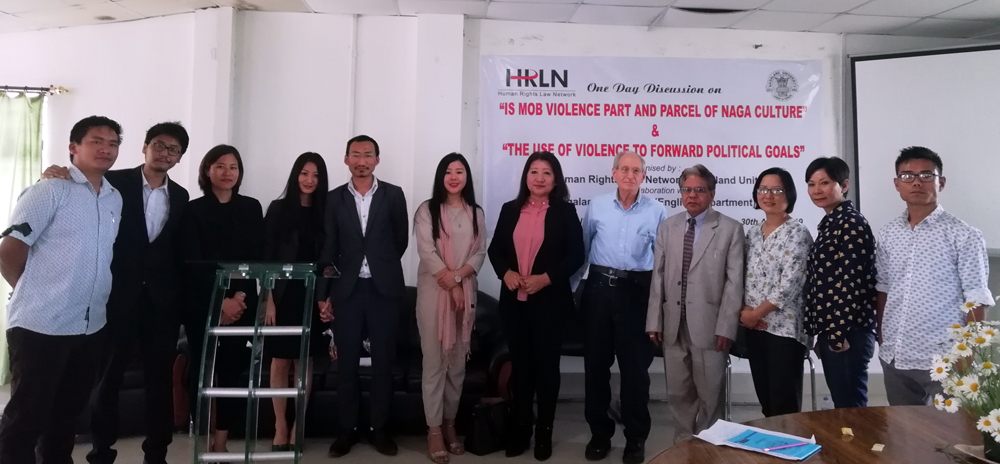Nagaland
Mob violence inherent in Naga culture – panel speakers

Dimapur, May 1 (EMN): Various speakers were unanimous in their speeches that mob violence was inherent in Naga culture as evident from the past instances in which the whole community sometime comes together against individual or village on the issues of territorial claim or on the issue of village against village and tribe against tribe.
Speakers have spelled this out at the one-day discussion ‘Is mob violence part and parcel of Naga culture’ and ‘The use of violence to forward political goals,’ organised by the Human Rights Law Network (HRLN), Nagaland, in collaboration with English department of Nagaland University, held on April 30 at NU, Meriema Campus.
Speaking on the topic ‘Is mob violence part and parcel of Naga culture?,’ Prof. Dr. Rosemary Dzüvichü, HOD, English Department, NU, stated that mob violence was heard and seen through social media in a form of lynching, destruction of property or churches, attacks on Muslims. She, however, stated that on closer look at our history, we actually find ourselves very much involved in mob violence.
She substantiated here statement by citing past instances in which the whole community sometimes come together against individual or villages on the issue of territorial claims or on the issues of village against village and tribe against tribe.
“In the past, there was a time where Christians did not like and accept other denominations so they destroy churches of other denominations, chased out the people who do not follow same denomination,” Rosemary was quoted as stated. She stated that Nagas need to rethink and analyse seriously on the issue of mob violence.
She stated that the mob violence during the last ULB election arising out of reservation for women and mob lynching cases in Dimapur on March 5, 2015, and in Meluri should serve as a wake-up call for the Nagas. She urged the students to start thinking beyond village and tribe affiliation in order to timely tackle the numerous social evils including mob violence.
Speaking on the topic “The use of violence to forward political gain,” Robert A Silverstein, retired Assistant Deputy Commissioner of New York, writer, lawyer and M.Phil in Politics from Oxford University, stated that education does not make a person. He stated that a person can be educated and at the same time evil.
He lamented on the prevailing situation of Nagaland and gave an honest opinion about the ongoing issues in the state. Sharing his three and half years experiences in Nagaland, he observed that people do not seem to understand the rule of law as people forget the fact that there is a Constitution, which is the supreme law of the land.
He also encouraged the people from the younger generation to use their brain in finding solution to end the problems of the State.
Prof. Salikyu Sangtam, department of Political Science from St. Joseph College University, Dimapur, supplementing on the topic “Is mob violence part and parcel of Naga culture,?” stated that crowd has come to play an important role for tribal leaders and politicians to attain certain aims.
“It is interesting to note the transformation a person undergoes in a crowd. The conscious personality disappears and along with it goes his will power and his capacity to discern his actions. He becomes a puppet, a slave to the will of the puppet master,” he remarked. He stated that this phenomenon becomes better comprehensible when we consider the innate human need to obey especially ‘the need to obey without questioning the demands of the authority we see as legitimate.’
He stated that in blind obedience, ‘we even go to the extent of killing and harming innocent human being by following the majority’s opinion even if it is wrong.’ Due to the lack of courage and ability to make right decision, individual person goes with the opinion of the crowd, he added.
Neiteo Koza, advocate and administrator of HRLN, spoke on ‘Law and mob violence.’ She stated that mob violence is not a new happening in the state adding mob incidences are common when there is allegation of commission of crimes and during elections.
She narrated some incidences which is commonly practiced in Nagaland where alleged accused persons are manhandled and tortured by unauthorised public on a mere suspicion of committing an offence, which is illegal and is a punishable offence. She stated that there is no specific uniform law made for the offence of mob violence/ mob lynching till date.
She emphasised on a landmark judgment passed by the Supreme Court on mob violence/ mob lynching in Writ Petition (Civil) No.754 of 2016 where the Supreme Court has given a clear directive to the states under three specific heads- Preventive, Remedial and Punitive measures.
HRLN law officer, Pakinrichapbo, chaired the programme and delivered the introductory. The event witnessed participants from different background including professors, assistant professors, post graduate students from Nagaland University and NGOs.

